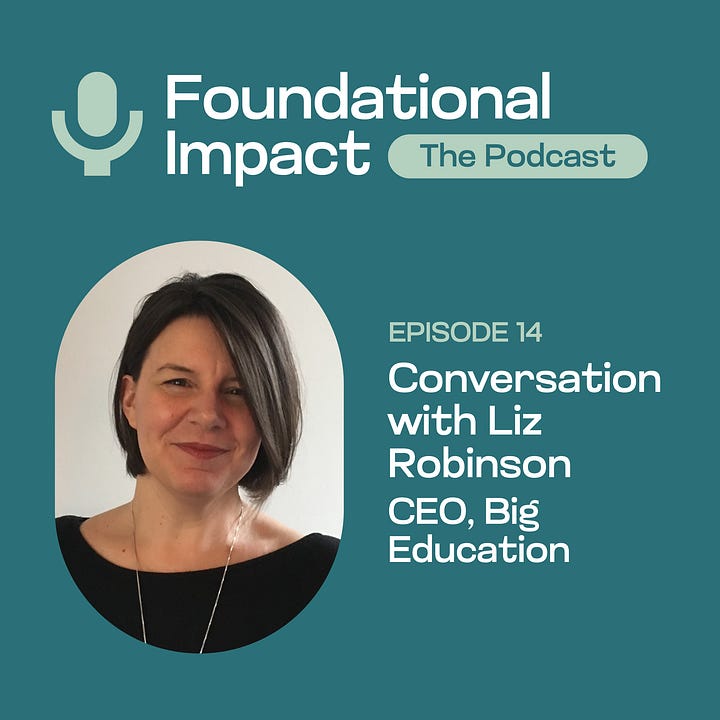February 25' Update
Daniel and Esther here, bringing you our February newsletter! When we talk about AI in education, the voices of educators tend to take center stage. But this month, we are shifting our focus to the students’ experience, highlighting two exciting student-focused projects. Also, through Joseph’s columns on “AI Big Picture” and “AI in Action”, we continue to explore how students maintain their agency and critical thinking in the age of AI and reveal students’ reactions to a course AI chatbot.
Happy reading!
Students Lead Global Conversation on AI in Education
The Good Future Foundation’s Student Council, a key pillar in steering our direction and activities, is proud to announce a significant new initiative. The Council is organising the Global Online Student Dialogues, inviting students worldwide to discuss how AI is shaping their future opportunities through two dialogue sessions.
This initiative has been made possible through valuable support from the Global Education Benchmark Group (GEBG). Melissa, GEBG’s Director of Professional Development and Intercultural Programs, has been working with our Student Council in the past few weeks, providing facilitation training and guiding them curate engaging discussion topics and prompts to ensure meaningful conversations for all participating students.
For schools and students interested in participating, additional information and registration details are available here.
Summer 2025: A Pioneering AI Learning Experience for Students and Educators


In partnership with Immerse Education, we’re launching our first fully-funded AI-focused summer programme, combining academic excellence with practical skill development. This residential experience, designed for students aged 14-17, weaves together AI learning, career insights, and social and cultural activities - offered completely free of charge to 35 students.
Set in the Royal Hospital School, a campus overlooking the Stour Estuary, a trailblazing group of students will master responsible AI application across various disciplines while developing crucial future skills in leadership, teamwork, and problem solving. In parallel, an intake of forward-thinking educators will develop a foundational proficiency in AI concepts and emerging technologies, gaining confidence to integrate these tools into their teaching and keep pace with their study body.
For programme details and to apply as students or teachers, please visit here or contact us below.
How Can We Preserve Students’ Thinking and Agency in an Age of AI?
In short:
Popularisation of free AI tools increases urgency for new ways of teaching and learning.
There is plenty of room for innovation within current curricula and schemes of work.
As AI becomes more agentic, let’s make sure we retain the students’ agency.
Practically this means more group projects, problem-based learning, personalisation, and fewer exams.
As usual, there has been rapid progress in AI adoption and utility. ChatGPT is now the sixth most visited site in the world, the UK and US refused to sign an AI agreement, and the importance of AI companies has been elevated to the Presidential level in both the US and China. It was impossible to miss the news about DeepSeek’s R1 model, and Europe’s champion has also emerged in Le Chat by Mistral AI. The real news, however, is that AI’s paywall is gone: competition has forced companies to make state-of-the-art AIs free for teachers and students to access.

That means we should now assume that all take-home assignments involve AI use, and to clearly tell students that while we encourage their exploration of new technology, we still expect them to be able to do the work without using AI.
A common refrain among AI-savvy teachers is that they are limited by public exam authorities and curriculum bodies, that current curricula simply don’t incentivise students to use AI ethically, because they often achieve the highest scores simply by letting AI write the entire essay or think for them. This “enfeeblement” was explicitly named by the Center for AI Safety as a major AI risk, so it should be a priority for teachers and school admins to figure out how to guide, monitor, and ensure that students use AI without ceding their own agency and critical thinking.

There are both technical and pedagogical answers to the issue. Technically, schools could give students education-tuned versions of AI that are instructed to not give students the answer, instead replacing direct answers with scaffolding questions to help students learn. Khan Academy was an early mover in this field, and it is becoming easier for more forward-thinking schools to set up their own AI interfaces using open source software so that they retain full control over students’ and teachers’ AI data.
Pedagogically, teachers should assign more group projects and allow more personalisation in homework. Group projects put students in a position to negotiate and reach resolutions, which make them great for developing agency and related soft skills like effective communication. Letting students assert themselves more in homework similarly benefits agency, such as assigning a position paper instead of a research report or asking them to propose what types of experiment they want to do. Presentations and viva voce also lets us move away from high-stress, high-stakes exams. Doing so would work well enough for now, until further research and experimentation guide us towards reformed curricula designed with AI and the future of work in mind.
Perspective: Education as a field moves slowly and cautiously, as we must when change will affect the lives and futures of so many. However, because AI is now free and accessible like never before, we need to move with uncharacteristic swiftness to make sure students and teachers are still in charge and are resistant against AI dependency.
What’s Next? Lots of AI literacy training, paired with mechanisms to monitor and track usage among teachers and students. Whether it’s declaration forms or regular surveys or something more sophisticated, it’s just useful to know whether and how AI is being used in your school. Administrators can further shape and guide the use of AI by specifying and paying for specific tools for teachers and students to use, which goes a long way towards establishing transparency and accountability.
An AI Chatbot That Knows What Your Course is About
In Short:
A custom course-specific AI chatbot can serve as a round-the-clock tutor
Restricting it to your own materials helps maintain consistency and relevant answers
Usage data shows students ask more questions and revise more frequently
Proper guardrails and training are essential to prevent misinformation and cheating
In theory, there’s a lot of good that an AI-savvy student can do. They can ask unlimited questions 24/7, they can dive deeper into and beyond the textbook while personalising their learning in a way that only the very rich could afford until recently (through an army of tutors). Yet most students aren’t tech-savvy, so how can teachers encourage, monitor, and safeguard AI usage?
In September 2024, my colleagues and I started an experiment where we created a custom AI chatbot that is programmed with data specific to an Intro to Psychology course at a community college in Hong Kong. This chatbot had access to the course’s lectures, outlines, and other data, and it is explicitly instructed to act as a course tutor only and refuse to answer any unrelated queries.
Students were introduced to the chatbot during course tutorials, which also came with very basic AI training such as showing them how to generate revision questions, to ask for analogies to aid understanding, to explain ideas in different languages, and of course telling them that AI answers can be wrong.
The start-of-semester survey gave us a few pleasant surprises: the majority of students know that AIs can give false answers, and many also note that cheating is a major risk (usually in the context of other students using it to cheat and creating unfair competition). However, they also reported that their AI use cases have been for replacing search engines (which is problematic because AIs can give factual mistakes), or using it to write/draft homework.
The chatbot’s usage rose gradually, with each midterm and deadline seeing a bump in usage. In the end-of-semester survey, AI usage frequency for the majority of students went from “twice a month” or “monthly or less” to “few times a week” and even “everyday”. We also received very different comments like “it’s easier to ask AI than to ask the teacher questions” or that “I can revise for a quiz faster with mock questions”. We believe that while rough around the edges, setting up AI course tutors represents one practical way to deploy AI while aligning with today’s curricula.

Several factors made this course well-suited to such a chatbot. It’s a large class, with nearly 300 students, which meant limited direct access to the lecturer, so there’s a lot to gain by introducing a 24/7 AI tutor. The course content is also introductory and well-established, such that even the base AI model (we used GPT-4o) could already give very good answers to the students’ questions, except the customisation ensures there is consistency and continuity in glossary, definitions, and assessment formats. Not to mention, it’s instructive to go through the chat transcripts to see whether students copied AI output verbatim, or to see how they are using AI to learn.
This project has been very encouraging and we are going deeper in the current semester, aiming to provide better training for students while scaling this tool to other courses by popular demand. I hope to give further positive updates as the semester progresses.
In the next edition…
How AI coding agents are used to help secondary students with zero coding experience go from concept to prototype within an hour, in a course that’s about using new technologies to promote sustainability and inclusion.
Send us your AI in Action questions, use cases, and ideas at info@goodfuture.foundation!
AI Quality Mark Highlights
AI in Ghana: A Regional Perspective for Schools
We’re proud to spotlight ICS Ghana, the first school outside the UK to earn the AI Quality Mark Bronze Award. Mr Enoch Oye, Vice Principal of ICS Ghana's Kumasi Campus tells us about AI's development in his country and its importance for regional education. You'll see just how much we all have in common as we navigate this new technology together, no matter where we are!
In recent years, the adoption of Artificial Intelligence (AI) technologies has gained momentum across the globe, and Ghana is no exception. As educators in one of the pioneering schools in Africa that has integrated AI into our work, we have witnessed firsthand the transformative potential of AI in the educational landscape.
AI encompasses a range of technologies that enable machines to perform tasks that typically require human intelligence. In education, AI can take various forms, including intelligent tutoring systems, adaptive learning platforms, and data analytics tools. In Ghana, AI is still budding, but its integration into classrooms is beginning to reshape how we approach teaching and learning in our school.
At the International Community School, we utilise AI tools to enhance student engagement, personalize learning experiences, and streamline administrative tasks. These tools offer resources that cater to diverse learning needs, allowing educators to tailor their instruction to individual students. We have adopted an AI platform that is more secured and very strict on ethical usage by users.
One of the most significant benefits of AI in education is its ability to facilitate personalised learning. In a country like Ghana, where classrooms may have students with varying levels of understanding, AI can help educators create customized learning experiences that meet each student's unique needs.
Educators often juggle multiple responsibilities, from lesson planning to grading and administrative duties. These tasks are causing teacher burn-out all the time. AI can automate repetitive tasks, allowing teachers to focus more on instruction and student interaction. At our schools, we have cut down the several hours of lesson planning done by teachers over the weekend through the lesson preparation tool on the magic school platform. Teachers now can keep their energies on the real teaching and learning in the classroom. This increased efficiency can lead to improved teaching practices and better learning outcomes. AI platforms also present teachers with the opportunity to improve their craft through the great search responses and brainstorming ideas that comes from AI
AI platforms offer a wealth of educational resources and tools that can be accessed from anywhere using the internet. This accessibility is particularly crucial in Ghana, where some schools may face limitations in access to high-quality teaching resources. AI can bridge this gap by providing equitable online access to resources for all students.
As we integrate AI into our classrooms, we also prepare our students for a future where digital literacy and technological skills will be paramount. Familiarity with AI tools will equip students with the competencies needed to thrive in an increasingly digital world.
Integrating AI in Ghana's educational landscape is absolutely essential because it has the potential to revolutionize teaching and learning. AI can be a huge support that empower educators and enhance student experiences. By investing in AI technologies, we are not only improving our schools but also preparing our students for the challenges and opportunities of the future. The journey is just beginning, but with continued support and innovation, we can create a brighter and more equitable educational environment for all.
Connect and Learn: New Community Meetings Launch
Throughout our AI Quality Mark program, we've seen many schools taking their first steps in AI adoption, all eager to learn from and collaborate with peers.
To support this growing community, we're launching bi-monthly meetings for AI Quality Mark participants. These sessions will tackle challenges around AI integration, explore practical solutions, showcase various AI tools for teaching and learning, and share resources and best practices.
A unique feature of these meetings is our AI sandbox - a space where teachers can freely experiment with different AI tools between sessions and share their experiences with colleagues.
If you are interested in joining too, please contact us to be part of these collaborative sessions!
Celebrating Success: New AI Quality Mark Awardees and Community Growth
🎉 Congratulations to Tring School and King’s School Rochester on achieving their Bronze Award this month!
We appreciate both schools have demonstrated commitment to safe and responsible AI integration across their operations, diligently completing the self-assessments and providing supporting evidence. Their journey continues as both schools, following meetings with our assessors, are already planning strategically to enhance their AI implementation further.
While the Quality Mark is valid for 3 years, we warmly encourage schools that have completed their first assessment and connected with our assessors to resubmit anytime as they progress and aim for a higher award.
🌟 Welcome to our new participating schools
We're delighted to welcome seven schools and multi-academy trusts to the AI Quality Mark framework:
Amadeus Primary Academies Trust
Bow School
Midleton College, Midleton, Cork, Ireland
The National Mathematics and Science College
Watergrove Trust
Westgate Primary School
Wymondham College
YMCA of Hong Kong Christian College
🔎 Explore the AI Quality Mark
Want to Learn More ? Join our upcoming session with the CAS AI Community to understand the framework's benefits and hear school success stories. Register here.
Ready to Begin? Sign up below to explore how the framework can support your school's AI integration. We'll contact you after receiving your registration.
Foundational Impact Podcast: Insights from Lori van Dam and Liz Robinson
Our podcast continues with two visionary voices in education. Hult Prize CEO Lori van Dam reveals how student innovators across 100+ countries are combining social impact with sustainable business, while Big Education Trust CEO Liz Robinson shares her candid journey from acknowledging AI's overwhelming implications to launching initiatives that help school leaders confidently embrace this new era.
Tune in to hear their perspectives on leading with purpose in an AI-powered world!















Thanks for sharing!